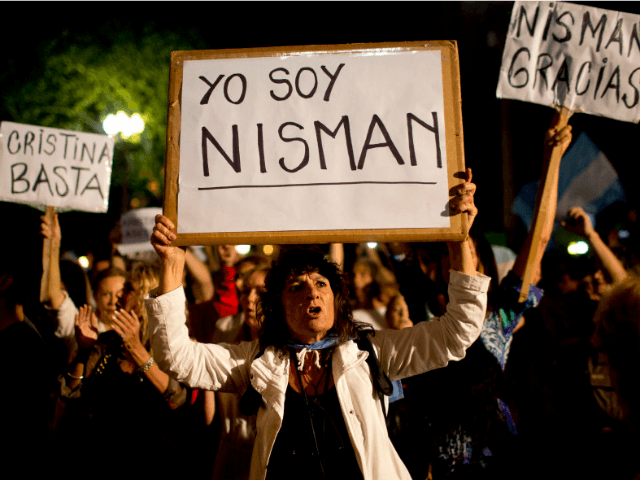The Brazilian magazine Veja published a report this Saturday alleging that former high-ranking officials in the government of Venezuelan strongman Hugo Chávez have proof that Venezuela helped Argentina protect Iranian terrorists believed to be responsible for the deadliest terror attack in Argentina’s history.
Following the blockbuster story, a major figure highlighted as an intermediary between Iran and Argentina confirmed in a televised interview Sunday night that money had indeed flowed from one of the alleged masterminds of the bombing to Argentine mosques.
The Veja report, translated from Portuguese to Spanish by Argentine news outlet Infobae, cites several officials described as “ex-members of Hugo Chávez’s cabinet” who now live in exile in Washington, D.C., after defecting from the current regime of President Nicolás Maduro. Those interviewed claim that “Argentine government representatives received large quantities of money from Iran,” and that Iran explicitly requested Argentina’s help in protecting Hezbollah terrorists responsible for the 1994 bombing of the Argentine Israel Mutual Association (AMIA), an attack that left 85 dead and dozens wounded.
The officials interviewed by Veja claim to have been present during a conversation that took place between Chávez and Ahmadinejad, in which the latter described protecting the Iranian terrorists as “a matter of life or death” that would be pivotal in helping Iran attain nuclear weapons. Ahmadinejad allegedly requested that Venezuelan diplomats help persuade the Argentine government to help Iran, both in the AMIA case and in sharing knowledge on the construction of heavy water nuclear reactors. Upon receiving an affirmative answer from Chávez, Ahmadinejad allegedly assured him: “don’t worry about the expenses this operation requires. Iran will back you with all the money necessary to convince the Argentines.”
The Veja report adds that it is widely believed that the American DEA has compiled a list of witness testimonies that ties high-ranking Chavista governor Tareck El Aissami to Hezbollah and the Revolutionary Armed Forces of Colombia (FARC), and El Aissami allegedly helped fabricate fake Venezuelan passports to help Hezbollah terrorists, including Mohsen Rabbani– the alleged architect of the AMIA attack– travel the world.
The allegations in the Veja report align with the claims present in a report by Argentine prosecutor Alberto Nisman, who was to present an accusation against the Argentine government for helping protect the terrorists responsible for the AMIA bombing to Congress but was found dead of a bullet wound to the head the day before his testimony. Nisman’s death was initially ruled a suicide, but investigators have since reopened the death as a homicide case.
Adding to the intrigue surrounding the case on Sunday night was a live televised interview on Argentine television in which a suspected Iranian agent claimed that the aforementioned cleric Rabbani had indeed transferred money into Argentina. Jorge Alejandro “Yussuf” Khalil, secretary general of the At-Tauhid mosque in Argentina, was named in Nisman’s report as a co-conspirator in the operation to help the architects of the AMIA bombing remain out of the custody of law enforcement. Speaking on the program La Cornisa, Khalil claimed the money from Rabbani had been meant merely for mosque infrastructure.
“With Rabbani we had no exchange of money,” he claimed initially, immediately adding, “We can discuss the matter of the prices or quotes because we had cultural work… Many times Tehran universities contributed to us and we said ‘we need this much for religious work.'” In his defense, Khalil claimed that, aside from those directly wounded by the bombing and their families, “those most damaged by the AMIA bombing were the Islamic Community.”
Iran has remained mostly silent on the matter of Nisman’s accusations that it had negotiated more amenable oil prices for Argentina in exchange for help in getting those responsible for the AMIA bombing off of Interpol’s wanted list. No one has been arrested for the 21-year-old attack.
The Iranian government did issue a statement regarding Latin America over the weekend, however– a defense of Venezuela against a new round of sanctions from the White House, which deemed the nation a “national security threat” in the new executive order.
“The Islamic Republic supports Venezuela, a sovereign and influential nation in Latin America,” Ministry of the Exterior spokeswoman Marzie Afjam said in a press conference over the weekend. “The politics of unilateral sanctions is frustrated and its inefficacy has been proven. The time for sanctions has passed,” she concluded.
Negotiations between Iran and the United States, as well as a coalition of other Western nations, continue regarding Iran’s ambitions to become a nuclear state.

COMMENTS
Please let us know if you're having issues with commenting.